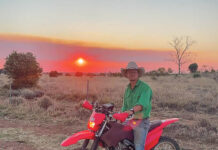LINESVILLE, Pa. – When dusk falls upon Townline Farm Poultry Reserve, the baby turkeys begin to “sing” their bedtime song.
As the sun begins to quietly fall and the sky turns to shades of amber, young poults’ chirp-chirping softly fills the air.
This “song” goes on and on until the babies finally sing themselves to sleep.
This is a sound that Bill Yockey hears every evening outside his bedroom window where the newest additions to his heritage breed turkey flock are kept.
City raised. Sometimes Yockey, originally a Pittsburgh city-boy, wonders how a simple move to the country could snowball into a 34-acre farm in Crawford County, Pa., with approximately 400 rare breed turkeys.
Yockey, 50, moved to northwestern Pennsylvania to do some hunting and fishing in the country.
But the grass just grew too long, too fast and he needed help to keep it mowed – so he bought 10 lambs to help out.
Those 10 little lambs soon grew to 55. Then a neighbor asked if Yockey would mind raising some turkeys for him at Thanksgiving. Yockey obliged.
“I bought six turkeys and that was the end of me,” he said.
He now has White Holland, Narragansett, Midget White, Jersey Buff, Red Slate and Kardosh Bronze varieties and works to preserve these heritage breed turkeys.
And he hasn’t been fishing in more than 16 years.
Switching breeds. Although Yockey started raising commercial broad-breasted turkeys, he soon found that they grew too quickly, so he switched to raising heritage breeds.
He thinks these birds are much healthier. They are forage-fed on grass, rather than pellet-fed, and live outside in open pasture for most of the year rather than in the traditional confinement quarters.
The turkeys breed naturally, unlike commercial birds, which are bred with artificial insemination. Yockey’s breeder birds are 2 years old, while commercial birds are typically butchered within 6 months.
These mature turkeys average 18-20 pounds vs. commercial turkeys whose mature weight can top 40 pounds. Commercial toms can weigh 24 pounds within 16 weeks of birth.
“You don’t get as much meat per unit, but it’s much healthier,” Yockey said.
The birds also survive the elements better than commercial turkeys. Yockey’s birds roost at night and aren’t fazed by rain or storms. He said they’re tough; they just “hunker down and hold on.”
There are also 26 American Buff and Pilgrim geese on the farm. These breeds are also rare and Yockey raises them to preserve the gene pool.
Turkey time. Each of Yockey’s turkey varieties and geese breeds are on the American Livestock Breeds Conservancy critical list. According to the conservancy, this means there are “fewer than 500 breeding birds in North America, with five or fewer primary breeding flocks.”
Although Yockey sells turkeys at Thanksgiving and sells eggs and poults throughout the year by word of mouth, he said his main goal is not making a profit but the survival of these rare breeds.
In fact, Yockey’s least favorite job of all is having birds butchered. Nevertheless, he acknowledges that it’s part of the job.
Beyond that task, this farmer certainly has a soft spot for the birds.
Any birds born with tendon problems, known as cripples, are kept as pets on the farm. These birds cannot be used for breeding and they would typically be euthanized because they don’t serve a “purpose.”
However, Yockey keeps the deformed birds and lets them enjoy their days with the other birds in the pasture. He said he doesn’t mind taking the time to care for them, although they can’t be used for meat or breeding stock.
Every little victory. While butchering is Yockey’s least favorite job, what he enjoys most are the victories – when weak chicks defy the odds, with his tender loving care, and survive.
One of his most memorable victory stories is about a baby lamb that was born in the barn doorway. It was so cold outside that the amniotic fluid was frozen on her body and she was so cold to the touch that Yockey thought for sure he had lost her.
Just in case, though, he gave her a shot, wrapped her in a warm blanket and brought her inside the house.
After chores that night, he walked in the door to the bleating of a baby ewe on her way to recovery.
Catching on. So how does a city-boy learn the ropes of turkey farming? He learns from scratch and becomes a self-made farmer.
Yockey learned everything he knows from a small library of books he has accumulated over the past 12 years since he began raising turkeys. He also keeps in touch with Rare Heritage Turkey Association, an online chat group. (To subscribe, go to www.onelist.com/subscribe.cgi/RareHeritageTurkey.)
Pop, pop. Despite the rush of people wanting turkeys for Thanksgiving, Yockey’s busiest time of year is March-June, breeding and hatching season.
“That’s when I’m most schizophrenic,” he said. “It’s like a dairy farm calving every day, one right after the other.”
Yockey’s girlfriend, Danya Bridgen, who helps on the farm as well, likens the process to popping popcorn.
They wait and wait and wait with an eye on the incubator, and nothing happens. Then, suddenly, the turkeys begin to hatch all at once – like popcorn. And they just keep coming and coming, even when they think the end has to be in sight.
The babies are kept in the brooder for a month to six weeks until the birds feather.
This is one of the most critical stages because the poults are fragile at this age. It has to be at least 90 degrees on the floor of the brooder and as dry as possible.
Although this is the busiest season, Yockey also has to balance his time on the farm with the time required at his full-time job off the farm as a clinical social worker.
Other friends. Obviously by Yockey’s descriptions of the turkeys’ song, he has a special affinity for his birds.
He doesn’t hesitate to “gobble” or “chirp” from one pen of turkeys to those in the pasture across the driveway. And… they always answer him.
This animal kinship extends beyond turkeys. He’s got a soft spot for a 13-year-old Suffolk sheep from the first birthing on his farm. In addition, Yockey has seven other “retired” ewes and six donkeys with another one on the way.
Several years ago, Yockey adopted the two oldest donkeys from the federal government’s Bureau of Land Management. These two continue to increase their family.
Finding good help. And who does this animal lover “employ” as help around the farm?
Cats, of course. They are great at their job, he said. He hasn’t seen a rat since they started “working.”
So as the baby turkeys begin their lullaby and the cats take their nightly guard, Yockey is able to sleep soundly, knowing his farm is in good hands.
For more information about Yockey and his poultry reserve, call 877-632-9242 or visit www.townlinefarm.com.
(You can contact Kristy Alger at 1-800-837-3419, ext. 23, or by e-mail at kalger@farmanddairy.com.)









